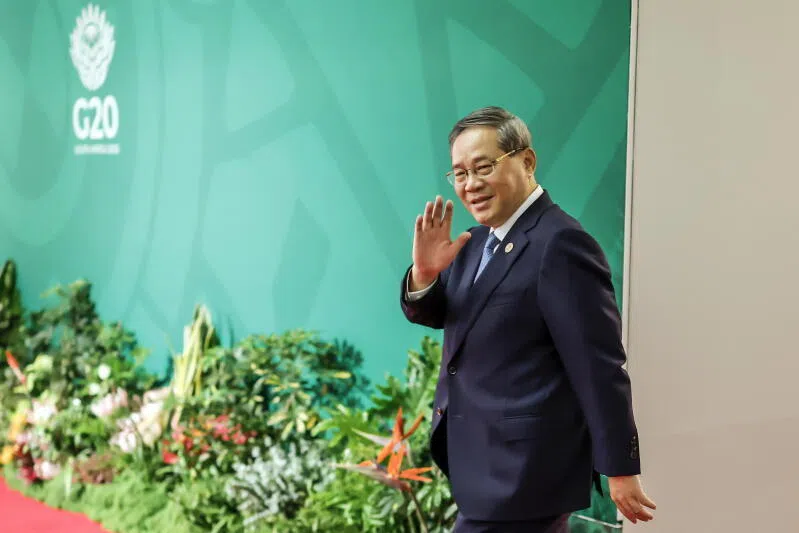China’s Premier Li Qiang launches charm offensive on rare earths at G-20
Sign up now: Get ST's newsletters delivered to your inbox

China’s Premier Li Qiang arriving at the G-20 Leaders' Summit in Johannesburg, South Africa, on Nov 23.
PHOTO: EPA
Follow topic:
JOHANNESBURG - China’s Premier Li Qiang came to the Group of 20 (G-20) summit not only poised to defend his country’s rare earths curbs, but also armed with offerings to quell concerns of developing nations.
Critical minerals became a defining theme of Africa’s first G-20 summit this weekend
Mr Li had responses to both problems. In a speech on Nov 23, he justified the need to “cautiously manage” exports of minerals critical for military use, laying out China’s rationale for its sweeping curbs. Hours later, China unveiled details of a global mining initiative with friendly nations, in an apparent reply to US efforts to rally allies for an alternative rare earth supply chain.
Beijing will “promote mutually beneficial cooperation and peaceful use of key minerals”, Mr Li said, vowing his country would “safeguard the interests of developing countries, while prudently addressing military and other uses”.
President Xi Jinping has weaponised his nation’s chokehold on rare earths vital to making everything from missiles to mobile phones, as he sought to shield China’s economy from US President Donald Trump’s sky-high tariffs. Neither of those men were at this weekend’s summit, leaving China’s No. 2 official to field questions about Beijing’s trade war retaliation.
Even before talks began, the G-20 took a veiled swipe at China in a joint declaration, calling out “unilateral trade actions” that restrict access to critical minerals – an ongoing pain point for manufacturing nations such as Germany and Japan.
That document also featured a pledge to create a voluntary blueprint to ensure critical mineral resources “become a driver of prosperity and sustainable development”, reflecting the concerns of developing nations.
“Countries don’t just want China or the United States coming and drilling holes,” said professor of global development policy at Boston University, Kevin Gallagher. “They want China and the United States, in exchange for access to these minerals, to offer some kind of investment in refining.”
Reinforcing that point, President Luiz Inácio Lula da Silva made it clear Brazil refuses to merely be a supplier of raw materials. “We won’t be just exporters but partners in the global value chain for critical minerals,” he said in a speech.
At a press briefing as the summit wrapped, China unveiled details of its answer to that problem, launching a green mining initiative with 19 nations – including resources-rich Cambodia, Nigeria, Myanmar and Zimbabwe – alongside the United Nations Industrial Development Organisation. Beijing didn’t commit any dollar figure to the programme, however, in a document light on specifics.
The initiative is aimed at building an inclusive network to safeguard the “fair and reasonable, stable and smooth” mining of critical minerals, according to Chinese state media.
Irish Premier Micheal Martin said discussions at the G-20 around the minerals issue had been reassuring. “I would hope that because of these meetings and gatherings, we can avoid such situations happening in the future and have genuine access to rare earth minerals,” he told reporters.
European nations have been hit hard by China’s decision to require export licenses for metals with military purposes. A procession of leaders from France, Germany, the UK and Ireland are expected to head to China in the coming months, with access to rare earths likely high on their agendas.
China and the US are still finalising negotiations for granting “general licenses” that would free the flow of rare earths, after Mr Xi in October struck a trade truce with Mr Trump
Italian Prime Minister Giorgia Meloni on Nov 22 stressed to China’s premier the importance of securing supply chains for “components essential for industrial production”, according to the Italian readout. It wasn’t clear how Mr Li responded, as the Chinese statement made no mention of that discussion.
As the summit concluded, Ms Thandi Moraka, South Africa’s deputy minister of international relations and cooperation, said at a briefing alongside a Chinese official that for many African nations the priority was bolstering their technical capabilities.
“Many developing mineral-rich countries, especially in our continent of Africa, have not fully benefited due to under investment,” she added. BLOOMBERG

